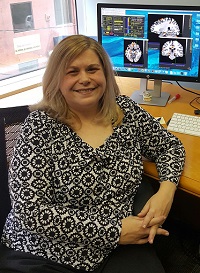 |
|||||
|
|||||
Dr. Young earned
a B.A. in
Psychology and Sociology at Dickinson College in Carlisle, PA, and her M.A. and
Ph.D in the Behavior, Cognition and Neuroscience program at American University
in Washington DC.
During her
graduate studies, Dr. Young also received the National Institute of Health’s
(NIH) post-baccalaureate Intramural Research Training Award (IRTA), allowing her
to conduct research in the Section on Neuroimaging in Mood and Anxiety Disorders
at the National Institute of Mental Health. After receiving her PhD, she was
recruited by the founding director of the newly created Laureate Institute for
Brain Research (LIBR) in Tulsa OK, Dr. Wayne Drevets, to complete her
postdoctoral training. In 2014, Dr. Young was awarded the NIH’s Pathway to
Independence K99/R00 award for her ongoing work investigating the therapeutic
potential of real-time fMRI amygdala neurofeedback, and a NARSAD Young
Investigator Award from Brain and Behavior Research Foundation in 2015. In April
of 2016 Dr. Young joined the University of Pittsburgh School of Medicine as an
assistant professor of psychiatry.
Dr.
Young’s research focuses on understanding the physiological mechanisms of
positive emotional information and autobiographical memory processing in healthy
individuals and individuals with mood and anxiety disorders through behavioral,
physiological, and functional imaging methods. Her focus is on understanding
onset and recovery from mental illness and developing new neuroscience-derived
neurobehavioral interventions, including real-time fMRI and EEG neurofeedback,
which target deficits in the processing of positive stimuli in patients with
mood-disorders.
![]()
Key Publications
Young, K. D.,
Siegle, G.J., Zotev, V., Phillips, R., Misaki, M., Yuan, H., Drevets, W.C.,
Bodurka, J. Randomized clinical trial of real-time fMRI amygdala neurofeedback
for major depressive disorder: Effects on symptoms
and autobiographical memory recall.
Am J Psychiatry. In Press. Link to
http://ajp.psychiatryonline.org/doi/full/10.1176/appi.ajp.2017.16060637
Young, K.
Erickson, K., Nugent, A., Fromm, S., Mallinger, A., Furey, M., Drevets, W.C.
Functional anatomy of autobiographical memory recall deficits in depression.
Psychol Med. 2012 Feb;42(2):345-58. PubMed
PMID: 21798113.
Young, K.,
Bellgowan, P.S.F., Bodurka, J., Drevets, W.C. Behavioral and neuropsychological
correlates of autobiographical memory deficits in depressed subjects and
individuals at high risk for depression. JAMA
Psychiatry. 2013 Jul; 70(7)698-708. PubMed PMID: 23677007
Young, K.,
Zotev, V., Phillips, R., Misaki, M., Yuan, H., Drevets, W.C., Bodurka, J.
Real-time fMRI neurofeedback training of amygdala activity in patients with
major depressive disorder. PLoS One. 2014 Feb 11;
9(2):e88785. PubMed PMID:
24523939.
Young, K., Siegle, G., Bodurka, J.,
Drevets, W.C. Amygdala activity during autobiographical memory recall in
depressed and vulnerable individuals; Association with symptom severity and
autobiographical
overgenerality. Am J Psychiatry. 2016
Jan 1;173(1):78-89. PubMed PMID:
26541813.